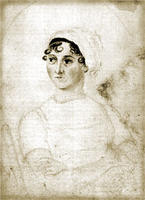Jane's Still "Got It"...

*Warning* This post is “slightly” slanted…
As a voracious lover of the classic writers, I submit that Jane Austen belongs at the top of the list. (At the risk of dating myself, I would even venture to say that Ms. Austen is the bomb.)
I’ve long been convinced that the World in General (in my humble opinion) is divided into two camps: those who embrace Jane Austen, and those who are determined to misunderstand her. There’s not much middle ground. People either “love” or “dismiss” the plain spinster from Hampshire, who, in a society of nearly exclusively male novelists, captivated readers everywhere with her brilliance. Her revelations of the idiosyncrasies of the upper middle class in Regency times have been hailed as comical, entertaining, and plain fun to read.
I am happy to report that nearly 200 years after her premature death, Ms. Austen still “has it” according to a poll conducted by the literary website Books.co.uk
In the poll, Books.co recently asked its patrons to name the “Greatest Hero in Literature.”
The winner? Mr. Fitzwilliam Darcy from Austen’s Pride and Prejudice (commonly known as the “most frequently read” of her known novels).
As reported in the October 13th edition of The Scotsman:
“It is a truth now universally acknowledged that when 4,000 readers are asked to pick their favorite character, Austen’s aloof, affluent country gent will triumph over Harry Potter, Oliver Twist and Sherlock Holmes…"(JK Rowling's boy wizard, at number two, was the only figure from the 20th century in the top five.)
Oliver Twist was voted number three; Pip from Great Expectations number four and Romeo Montague, from Shakespeare's Romeo and Juliet was number five.”
As for the illustrious Mr. Darcy, even before Colin Firth made the role swoon-worthy to 99% of the females who watched the 1995 Simon Langton-directed version of P&P, who could resist but admire the “wealthy, upper-class Darcy, who overcame his inflated personal pride to marry the spirited Lizzie Bennett, who came from a far less privileged family.”?
To me, Mr. Darcy is the ultimate “Prince Charming,” a knight in shining armor.
You have to hand it to Jane Austen, she was bloody brilliant. Pure and simple. Her grasp of life and its ironies was played out so grandly in her novels.
Granted, Jane Austen lived a LONG time ago. When she started writing seriously as a 20 year-old, it was 1795. Her first published novel, Sense and Sensibility, came out in 1811.
I have a theory about Jane; had she lived in modern day, as opposed to the Regency era, her stories would not be as perfect as they are. After all, her stories were written in the language of the time, and it’s all in the language. Isn’t it?
I have to wonder. It seems that to be a rousingly successful writer in today’s Adult Fiction world you have to have healthy doses of A) Sex B) Cursing C) something gross or sinister involving bloodshed and D) Edginess. (a.k.a latent Sexuality)
Not that there’s anything wrong with those things—I am merely demonstrating the differences between novels of today and novels in Austen’s time. Granted, Ms. Austen lived pre-Victorian age, so she alluded to sex in her books, but NEVER between her hero and heroine.
In that day and age, love between literary characters was intense, yet “noble and true”.
To demonstrate my point: putting it in today’s setting, would the love between Emma Woodhouse and Mr. Knightley in Austen's Emma be so pure and exhilarating (for the reader) if it was detailed how they constantly “did it” in her bedroom, in his bedroom, at the office, etc., and went into detailed depth about her relationship hang-ups and his occasional need for “space” from her clinginess and passive/aggressive personality?
Hmmm. Let me think…most likely NOT.
People just didn’t talk about those things back then. Not only that, but the wit and language Jane used in her day are so perfect, it would be a shame to even attempt to translate her words to the modern tongue. (I actually had a friend who lamented that they had an American translation of the Holy Bible, so why not Jane Austen’s works?)
To my friend’s point: yes, no one speaks that way anymore, except for maybe, well, nobody. And no one will speak that way again, sadly. And it was such a romantic and lyrical way of speaking, too. Were a writer to attempt Jane's manner of writing today, he/she would be laughed (possibly even snored) out of the Editor's office.
Understanding the archaic language of Yesterday can take effort. But it is indeed beautiful.
An example: When Mr. Darcy proclaims his love for Elizabeth Bennet, here is his poetic confession:
Mr. Darcy: “In vain I have struggled. It will not do. My feelings will not be repressed. You must allow me to tell you how ardently I admire and love you.”
…So if Jane were to write this same sentence today, it might sound something like this:
Mr. Darcy: Man, I’ve fought this, but I can’t help it. I dig you, Lizzie. I really dig you.”
Clearly there is no contest. Needless to say, I am VERY glad that Jane Austen lived when she did. Her prose is so perfect—it just wouldn’t be the same had she lived in the modern day.
So, Congratulations, “Auntie Jane”! You have proven once again that your timeless characters, flawed and human as they are, can outshine the ages with your wit, your humor, and your spot-on perspective of the Human Condition. Bravo! Well done.
Some Jane Austen Links:
Austen.com
The Republic of Pemberley
All Things Austen
Jane Austen Society of North America

0 Comments:
Post a Comment
<< Home